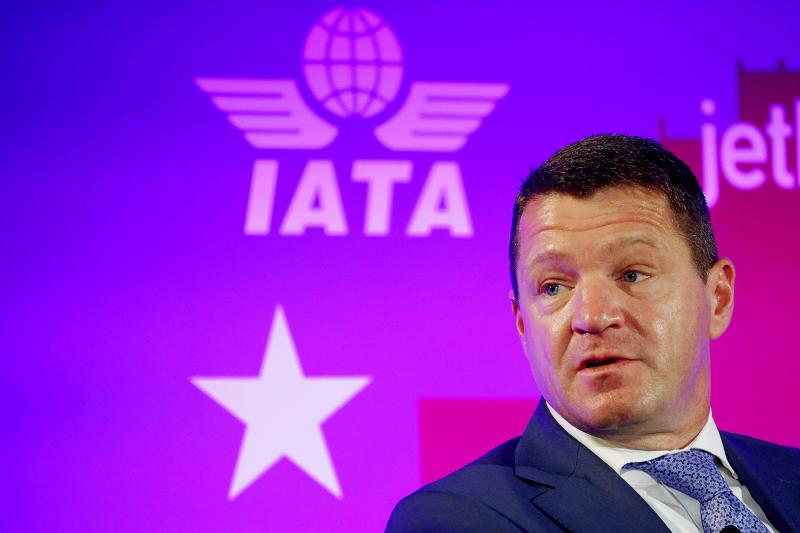The world’s largest association of airlines on Monday said that it is aiming for the air transport industry to reach net-zero carbon emissions by 2050, while acknowledging that it will be a “huge challenge.”
The International Air Transport Association (IATA), which has key offices in Geneva, said its general meeting in Boston had agreed on the target, a commitment that would line it up with the goals of the 2015 Paris Agreement, which aims to limit global warming under 1.5°C above pre-industrial times.
The industry appears to be counting heavily on a carbon-offset plan laid out by a UN organization on civil aviation, but suggests governments have a role to play, too.

Photo: Reuters
“With collective efforts of the entire value chain and supportive government policies, aviation will achieve net zero emissions by 2050,” IATA director-general Willie Walsh said in a statement.
The association said that industry can take steps through use of sustainable fuels, new airplane technologies, improved efficiencies and new power sources such as electric or hydrogen power — but carbon capture and carbon-offset programs would also have a role.
One scenario foresees sustainable fuels accounting for nearly two-thirds of the roughly 1.8 gigatons of carbon that would need to be mitigated for airlines to reach net-zero emissions, Walsh said.

China’s Huawei Technologies Co (華為) plans to start mass-producing its most advanced artificial intelligence (AI) chip in the first quarter of next year, even as it struggles to make enough chips due to US restrictions, two people familiar with the matter said. The telecoms conglomerate has sent samples of the Ascend 910C — its newest chip, meant to rival those made by US chipmaker Nvidia Corp — to some technology firms and started taking orders, the sources told Reuters. The 910C is being made by top Chinese contract chipmaker Semiconductor Manufacturing International Corp (SMIC, 中芯) on its N+2 process, but a lack

NVIDIA PLATFORM: Hon Hai’s Mexican facility is to begin production early next year and a Taiwan site is to enter production next month, Nvidia wrote on its blog Hon Hai Precision Industry Co (鴻海精密), the world’s biggest electronics manufacturer, yesterday said it is expanding production capacity of artificial intelligence (AI) servers based on Nvidia Corp’s Blackwell chips in Taiwan, the US and Mexico to cope with rising demand. Hon Hai’s new AI-enabled factories are to use Nvidia’s Omnivores platform to create 3D digital twins to plan and simulate automated production lines at a factory in Hsinchu, the company said in a statement. Nvidia’s Omnivores platform is for developing industrial AI simulation applications and helps bring facilities online faster. Hon Hai’s Mexican facility is to begin production early next year and the

Who would not want a social media audience that grows without new content? During the three years she paused production of her short do-it-yourself (DIY) farmer’s lifestyle videos, Chinese vlogger Li Ziqi (李子柒), 34, has seen her YouTube subscribers increase to 20.2 million from about 14 million. While YouTube is banned in China, her fan base there — although not the size of YouTube’s MrBeast, who has 330 million subscribers — is close to 100 million across the country’s social media platforms Douyin (抖音), Sina Weibo (新浪微博) and Xiaohongshu (小紅書). When Li finally released new videos last week — ending what has

AVIATION BOOM: CAL is to renew its passenger and cargo fleets starting next year on record profits as aviation continues to return to pre-pandemic levels China Airlines Ltd (CAL, 中華航空) yesterday said it is optimistic about next year’s business outlook, as the airline continues to renew its fleet on expectations that global passenger traffic would maintain steady growth and air cargo demand would remain strong. From next year to 2028, the airline is to welcome a new Boeing Co 787 fleet — 18 787-9 and six 787-10 passenger aircraft — to cover regional and medium to long-haul destinations, CAL chairman Hsieh Shih-chien (謝世謙) said at an investors’ conference in Taipei. The airline would also continue to introduce Airbus SE 321neo passenger planes and Boeing 777F cargo jets,